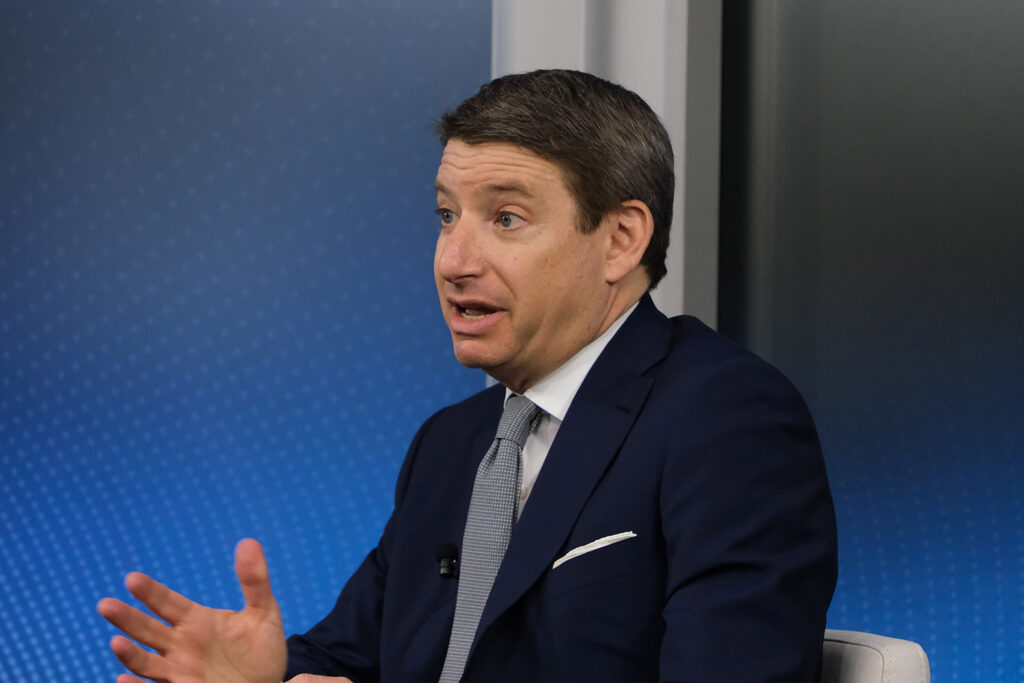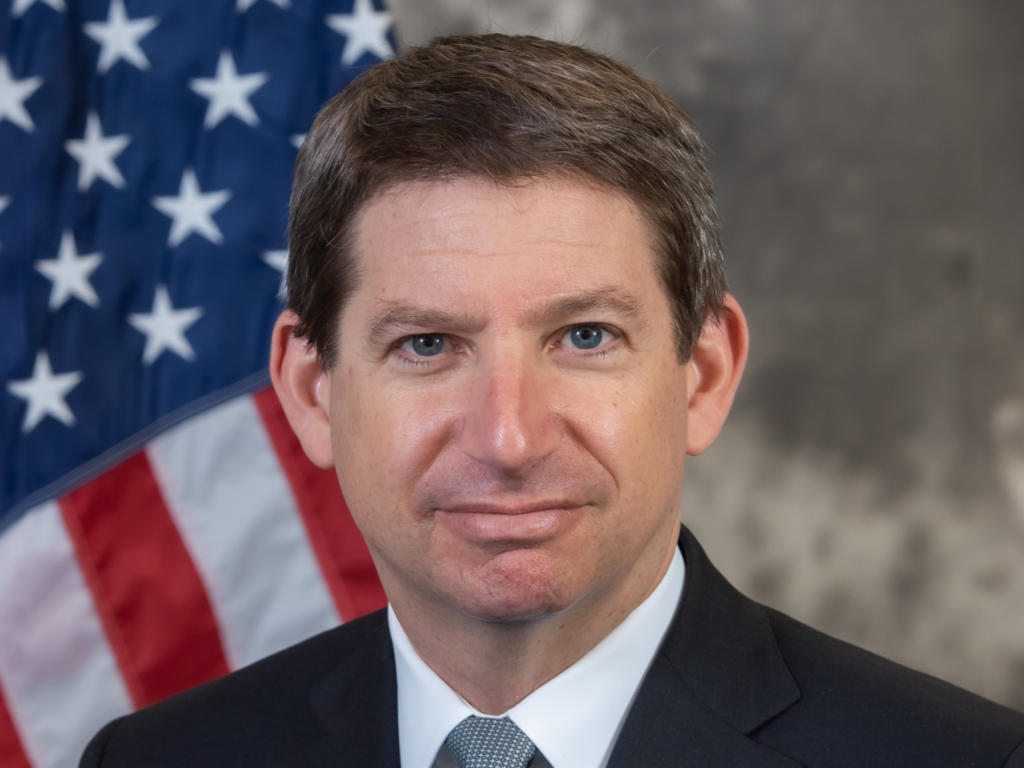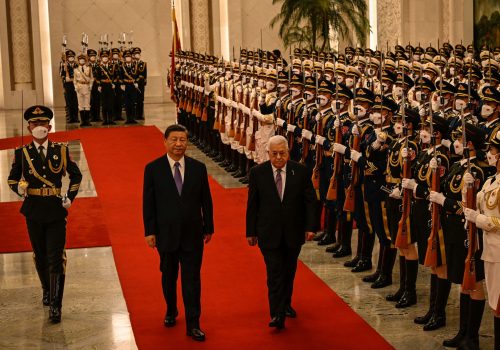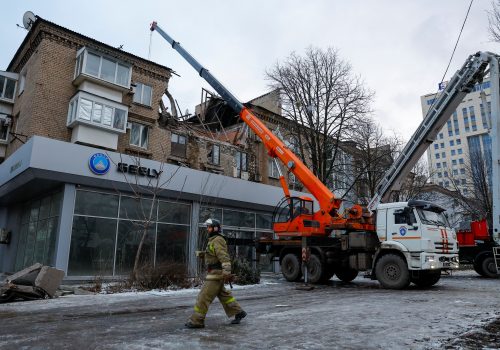Watch the event
The US International Development Finance Corporation (DFC) isn’t “directly competing” with China, according to its chief executive officer Scott Nathan, but it is “offering an alternative.”
Nathan spoke at an Atlantic Council Front Page event hosted by the Council’s Global Energy Center on Wednesday, explaining that the DFC is different from Chinese development banks or Chinese investment initiatives (such as the Global Development Initiative and Belt and Road Initiative) because it supports the private sector directly. The DFC doesn’t lend money to governments for “big and also sometimes bloated” projects that aren’t “appropriate for local laws and conditions,” he said, alluding to China’s investments that have pushed countries into deep debt.
The DFC head recalled how foreign government officials have told him that “they don’t want to be dependent on one country for their source of finance.”
“Good development is good foreign policy,” he explained. “That’s in our national interest.”
Here are more highlights from the conversation, moderated by Amelia Lester, executive editor of Foreign Policy.
Standing out in the marketplace
- How exactly does the DFC differ from China’s investment engines? Nathan said it’s in part because “we maintain the highest standards possible” when it comes to “environmental, social, [and] labor” practices. It is “critical,” he added, not only to support economic development but also to “promote . . . values.”
- One important area is in internet connectivity—in which China is investing heavily, particularly in the Indo-Pacific. The DFC, meanwhile, is supporting projects that push forward secure equipment and networks that protect privacy, Nathan said, highlighting specific DFC-supported projects in Australia and Africa that are offering an alternative to China’s services. “This is critical for growth,” he said, adding that infrastructure is “not just energy, airports, and railways. You need the infrastructure of the twenty-first century for economic development.”
- Nathan explained that the DFC was created by Congress in 2018 due to a “strong sense” among both Republicans and Democrats that the United States needed to improve its economic-diplomacy game. “We needed to show up in the developing world and offer an alternative to what was being offered by authoritarian governments and our strategic competitors,” he said.
- The DFC is due to be reauthorized by Congress in 2025. “There is a strong demand signal for us to do more to show up,” Nathan said. “That requires us being reauthorized; it requires continuous funding.”
Showing up for Ukraine
- Nathan explained that the DFC has provided nearly $500 million in financing to businesses in Ukraine and has offered political risk insurance—which includes coverage for war-related risks—that has catalyzed more investments in Ukraine’s private sector.
- The most critical tool to support Ukraine’s private sector, however, is “solid air defense,” Nathan said. It’s “hard to make decisions around investment and capital expenditure in an environment of such high insecurity.”
- Nathan explained that the United States has had a long history of providing political risk insurance. Since the Overseas Private Investment Corporation (DFC’s predecessor) started offering the insurance, he said, the United States has “done over $50 billion. . . of political risk insurance” and has had “just over a billion dollars of claims.” The institutions have covered 97 percent of those claims, he added. “So it’s not only been very important for economic activity. . . but it’s been very profitable.”
- Working in Ukraine, Nathan said, has shown him how important it is for the DFC to work closely with its peers, including the European Bank for Reconstruction and Development, International Finance Corporation, and European Investment Bank.
A diversified system
- Earlier this year, the DFC provided a $500 million loan to US company First Solar to build a new solar panel manufacturing facility in Tamil Nadu, India. Nathan said that the plant, which will use cadmium telluride sourced from India instead of China, “fits into the [DFC’s] supply chain diversification goals. . . We need to make sure that we’re not dependent on one country or one company for the inputs of the industries of the future.”
- “If we can do this kind of thing elsewhere in the world to make sure that supply chains are broadly diversified, that helps with resilience,” he argued, adding that the United States must not “replace dependency on oil” with dependency on “a couple of nations,” as that would bring “all sorts of strategic vulnerabilities.”
- “Having countries be able to be self-reliant, to have the energy they need for economic development, that promotes stability. . . that’s good for our security,” he said.
- On critical minerals, Nathan highlighted several projects underway in Africa, including one on graphite in Mozambique. And, he added, as the DFC invests in that project, it will also be working with the US Department of Energy, which has loaned a company in Louisiana funds to expand its capacity to produce graphite-based materials for batteries. “It’s critical to start with the sourcing of the minerals,” Nathan said. “But there’s a whole value chain” to support.
Katherine Walla is an associate director on the editorial team at the Atlantic Council.
Watch the event
Further reading
Fri, Apr 12, 2024
Dispatch from Kyiv: Ukraine is fighting for its economic survival, too
New Atlanticist By Olga Khakova, Charles Lichfield
The longer the war lasts, the more it will consume funds initially meant for long-term investments and reconstruction.
Wed, Jun 21, 2023
How Beijing’s newest global initiatives seek to remake the world order
Issue Brief By Michael Schuman, Jonathan Fulton, Tuvia Gering
Recommendations on how US policymakers and European and Indo-Pacific partners can better understand China’s latest development and security initiatives to meet the rising competition.
Wed, Feb 8, 2023
How to get the private sector involved in reconstructing Ukraine
New Atlanticist By
It will take more than government aid alone to rebuild Ukraine. The private sector can make a substantial contribution.
Image: Scott Nathan speaks at the Atlantic Council on April 24, 2024.




